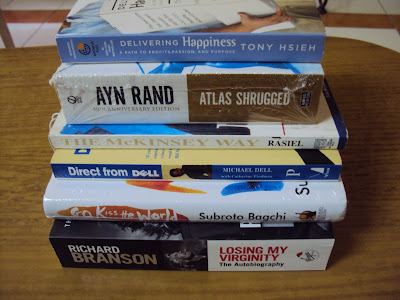The ultimate reason why we do anything is 'to be happy'.
In his book " Delivering Happiness" , Tony Hsieh - CEO of Zappos.com, stresses on the
'science of happiness'. He mentioned some of the frameworks of happiness and showed their
relation with business.
Tony suggests to build a business focusing on the 'Culture' or the 'Core values' of the company that leads to the happiness of everyone related to it (employees, customers, etc..) instead of just profits.
The framework I am discussing here is one of the things that he mentioned...
This Framework says that there are three types of happiness
- Pleasure.
- Passion.
- Purpose.
Pleasure:
This is the first type of happiness and we are very familiar with this one.
Here we constantly chase pleasures.
Generally we are in constant chase of money and material comforts thinking that they make us happy.
This happiness is about the momentary positive emotions we feel because of pleasures. We will be happy here only if we have a continuous inflow of stimuli...which is very difficult to maintain.
Once the source of stimuli goes away our happiness levels drop immediately. This type of happiness has the shortest life of all the three.
People do the jobs, even if they don't like, to enjoy the comforts/benefits that it offers. Once they get them, their happiness graph goes to peak and declines gradually again to initial point as they get bored of it. Then, they want something else and after getting it, the same happiness graph follows.
This is like the horse running for the carrot in front of it. Once it gets the carrot there will be /should be another carrot to rise its energy levels. Many times we, like the horses, run for the things in front of us thinking that they would bring happiness but most of the time we are wrong.
Some people after realizing the importance of 'sustained happiness' go after their true 'passion'/ 'calling' instead of 'pleasure'.
But many spend their entire lives in pursuit of pleasures without realizing that this happiness fades away quickly. They don't realize what brings them a 'sustained happiness.'
Passion:
This type of happiness is known as 'flow' or 'state of being in the zone'. Here you are engaged in
the work you do and time flies by without your notice.
Flow is different from pleasure. In pleasure you feel it...you know it... but in flow you cannot feel
anything...you become one with your passion. You get engaged in your passion.
Knowing your 'higher strengths' will help you in achieving this type of happiness.
You have a passion and you are happy pursuing it. But can you still go a higher stage of happiness??
Yes.
Passion leads to satisfaction but still it doesn't complete the picture.
That is why many successful people work for a greater cause/ purpose after sometime in their careers.
Purpose:
This type of happiness is about being part of something bigger than yourself that has a meaning to you. It is using your higher strengths in the service of something or someone.
This gives a complete satisfaction.
It doesn't have to be something like philanthropy always. If the work you are doing touches the lives of many people/ have a positive impact on a large scale...it leads to complete happiness.
Unlike in 'pleasure'...in 'passion' and 'purpose' the happiness graph doesn't fall down but stays
there.
According to the research, pursuit of pleasure has almost no contribution to the satisfaction. Purpose has the strongest effect on satisfaction and then comes the passion. And pleasure matters only if you have both passion and purpose.
We tend to think about 'pleasures' first then passion and finally purpose.
But as Tony Hsieh says, the right strategy would be to first find the purpose and focus on our passion and then enjoy the pleasures that you meet on the way. This leads to 'sustained happiness'.
In other words focus on your passion with a purpose and pleasures follow.








